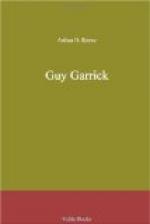“Of course, by all means,” reiterated Garrick. “The fact is, I expect our next important clew will come from this place. The only thing I want you to be careful of, Dillon, is not to be hasty and make an arrest.”
“Not make an arrest?” queried Dillon, who still felt the fumes in his throat, and evidently longed to make someone pay the price—at least by giving him the satisfaction of conducting a “third degree” down at headquarters.
“No. You won’t get the right man, and you may lose one who points straight at him. Take my advice. Watch the place. There’s more to be gained by going at it cautiously. These people understand the old hammer-and-tongs game.”
Just then the smaller outside door grated on its rusty hinges. We sprang to our feet, startled. Dillon leaped forward. Stupefying guns had no taming effect on his nationality.
“Well, commish, is that the way you greet an old friend?” laughed McBirney, as a threatened strangle-hold was narrowly averted and turned into a handshake. “How are you fellows? I got your message, Garrick, and thought I’d drop around. What’s the matter? You all look as if you’d been drawn through a wringer.”
Briefly, to the accompaniment of many expressions of astonishment from the insurance detective, Garrick related what had happened, from the raid to the gas-gun.
“Well,” gasped McBirney, sniffing the remains of the gas in the air, “this is some place, isn’t it? Neat, cozy, well-located—for a murder—hello!—that’s that ninety horsepower Despard that was stolen from Murdock the other day, or I’ll eat my hat.”
He had raised the hood and was straining his eyes to catch a glimpse of the maker’s number on the engine, which had been all but obliterated by a few judicious blows of a hammer.
Garrick was busy telling McBirney also about the marks of the tire on the floor, as the detective looked over one car after another, as if he had unearthed a veritable treasure-trove.
“No, your man could not have been at either of the gambling joints,” agreed McBirney, as Garrick finished, “or he wouldn’t have called up. But he must have known them intimately. Perhaps he was in the pay of someone there.”
McBirney was much interested in what had been discovered, and was trying to piece it together with what we had known before. “I wonder whether he’s the short fellow who drove the car when it was seen up there, or the big fellow who was in the car when Warrington was shot, up-state?”
The question was, as yet, unanswerable. None of us had been able to catch a glimpse of his figure, muffled, in the darkness when he shot us.
All we knew was that even this man was unidentified and at large. The murderer, desperate as he was, was still free and unknown, too. Were they one and the same? What might not either one do next?
We sat down in one of the stolen cars and held a midnight council of war. There were four of us, and that meant four different plans. Dillon was for immediate and wholesale arrests. McBirney was certain of one thing. He would claim the cars he could identify. The garage people could not help knowing now that we had been there, and we conceded the point to him with little argument, though it took great tact on Garrick’s part to swing over Dillon.




